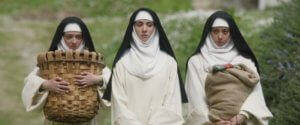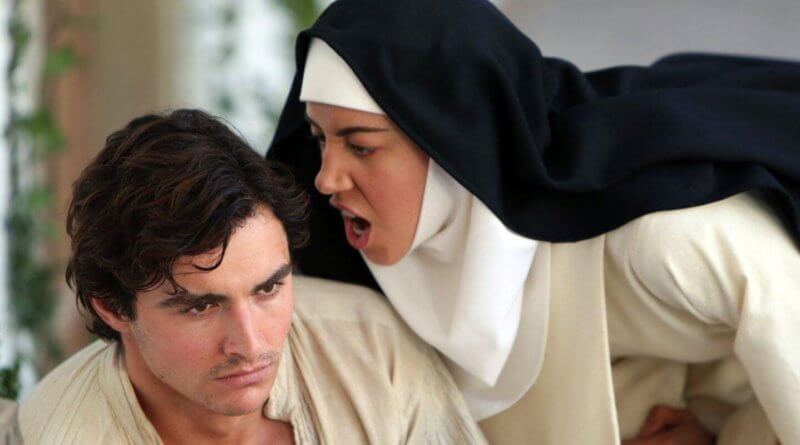Review: The Little Hours (2017) ★★★½
There is a popular trend that has worked its way through the comedy world for years, and now it has found a home in contemporary American cinema: it is the juxtaposition of subjects and formats that are traditional, wholesome, serious, or even sacred, with the crude, abrasive humor of the standup comedy world. While this is technically nothing new, it has gained steam recently with comedians like Seth Rogen, who has used this technique in films like Sausage Party (2016), which combines crass humor with animation that is generally reserved for children’s films, and The Interview (2014), a comedy about assassinating North Korea’s dictator, Kim Jong-Un. Similarly, Jeff Baena’s The Little Hours, loosely based on the The Decameron, a collection of novellas from 14th-century Italian writer Giovanni Boccaccio, combines the humble, reverent setting of a convent in the Middle Ages with the overt sexuality, abrasive language, and general irreverence of modern improvisational comedy. Though the film works well, and is genuinely funny, it relies a bit too much on these strange bedfellows and the natural talent of its cast, rather than quality writing or storytelling.
The plot focuses on the inhabitants of a secluded convent, Father Tommasso (John C. Reilly), Sister Marea (Molly Shannon), and three young nuns: Alessandra (Alison Brie), Ginevra (Kate Micucci), and Fernanda (Aubrey Plaza). When the three foul-mouthed nuns verbally abuse the gardener, he quits, leaving Father Tommasso desperate to find a replacement. Meanwhile, Massetto (Dave Franco), a handyman for the local nobility, is caught sleeping with his master’s wife, and is forced to flee the castle. When he runs into a drunken Father Tommasso in the nearby woods, the two strike up a deal to solve both of their problems: Massetto will work as the new gardener at the convent, posing as a deaf-mute so that the nuns will be less inclined to fight with him, and Father Tommasso will keep him in hiding until Lord Bruno (Nick Offerman) ends his pursuit of Massetto. However, Massetto’s presence brings chaos to the quiet convent, and sets off a string of events that reveal the private sins of everyone involved.
Even though the disparate elements in the narrative fit together well, it feels like the filmmakers simply wanted to cram in as many sacrilegious subplots as possible to infuriate the Catholic League (who naturally denounced the film). In one particular scene, the presiding Bishop, Bartolomeo (Fred Armisen) visits the nuns, only to realize that they are perhaps the most corrupt and sinful group under his tutelage; he brings each of the offenders forward, listing their many transgressions, which include such crimes as homosexuality, witchcraft, and “eating blood.” Though the extremity of their sins functions as part of the joke, it looks a lot like pushing the envelope just for the sake of being edgy, which does take away from the film as a whole.

Just about every scene in the film is hilarious, mostly because the characters do little to make themselves fit the poise and vernacular of the times, instead behaving like a group of horny 20-somethings living in the present. Much of the dialogue is improvised, and though this makes the banter even funnier at times, it could have benefited from a more polished approach. The story meanders from one clumsily structured sequence to the next.
For better or worse, this is the basis of pretty much all of the laughs. The film aims to shock, with Aubrey Plaza (among others) engaging in lesbian sex scenes, while also attempting to be a pious nun from the Dark Ages. Despite this being a purposeful attempt to enhance the contrast between what is sacred and secular, it leaves audiences wanting more from a film that could have been a work of comedic genius with an otherwise brilliant concept and talented cast.
Though the writing is a bit lacking, the mise en scène helps legitimize the film and give it an entirely unique quality. The buildings, landscapes and costumes are all meticulously crafted to reflect the times and European setting, which, when set against the ridiculous dialogue and over-the-top irreverence, make The Little Hours an extremely enjoyable and hilarious viewing experience. So often these kinds of comedies are hampered by low budgets and poor production value, but Baena and his crew pulled out all the stops, and it really adds to the inherent humor of the script. Baena defies audiences not to crack up when contrasting solemn tradition with nihilistic comedy.
While those who are more traditional or devoutly Catholic will probably find nothing of value in The Little Hours, for the rest of us, it is a refreshing, inventive and funny film that is not afraid to mock religious zealotry.
Rating: ★★★½ out of 5
If you’d like to watch The Little Hours, it is available to rent or purchase via Amazon here.

